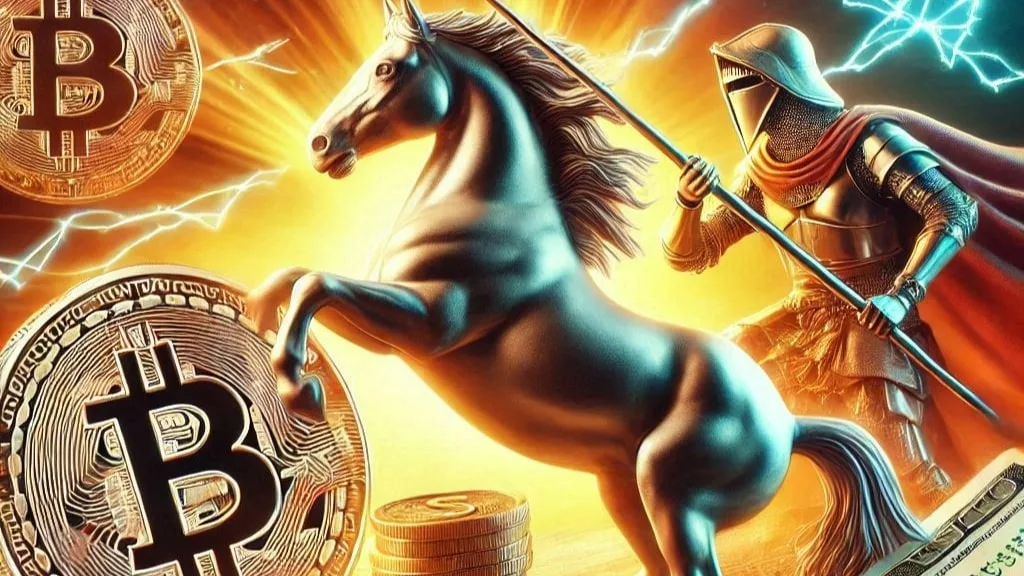
Russian President Vladimir Putin has publicly acknowledged the potential of cryptocurrencies, especially Bitcoin, as part of a broader strategy to reduce Russia’s dependence on the U.S. dollar and strengthen the country’s financial independence. The statement has stirred discussions among global financial experts, raising questions about the future of international trade and economic power.
Putin’s remarks, made at the Moscow Investment Forum on December 4th, reflect a significant change in Russia’s approach to digital currencies, which he had previously been critical of. Now, he views cryptocurrencies as a viable means to reduce costs, increase financial security, and mitigate the vulnerabilities tied to foreign currency reserves.
For years, Russia has been cautious about Bitcoin and other cryptocurrencies. Putin himself had voiced concerns over the potential risks associated with digital assets. However, in his recent address, he acknowledged that digital currencies are becoming an unavoidable part of the global financial landscape.
“Who can ban Bitcoin? Nobody. And who can prohibit the use of other electronic means of payment? Nobody. Because they are new technologies,” Putin said during his speech. This statement marks a clear shift in his stance, recognizing that digital currencies are here to stay and will continue to play a significant role in the future of finance.
Putin also made it clear that no matter what happens to the U.S. dollar, digital currencies like Bitcoin will continue to evolve. “These tools will develop one way or the other because everyone will strive to reduce costs and increase reliability,” he added. His comments suggest that Russia intends to embrace this financial evolution as a means to safeguard its economic interests, especially in the face of external pressures.
Putin’s change in perspective stems from his ongoing criticism of the U.S. dollar’s dominance in global trade and finance. Russia, along with several other nations, has long expressed concerns over the dollar’s central role in international transactions, particularly how it has been used as a tool for political leverage by the U.S.
The Russian government argues that the dollar’s preeminence leaves countries vulnerable to sanctions, which can be weaponized for geopolitical purposes. By turning to cryptocurrencies, Russia hopes to lessen its reliance on the dollar and create an alternative financial infrastructure that is less susceptible to external manipulation.
Putin’s remarks at the forum reflected his dissatisfaction with the U.S. using the dollar as a tool of political influence. This growing frustration is prompting Russia to explore alternatives, such as digital currencies, to protect its economic interests and enhance financial sovereignty.
Further indicating his commitment to this new direction, Putin recently signed a law that grants digital assets legal recognition, particularly in foreign trade transactions. The law is designed to create a framework for incorporating cryptocurrencies like Bitcoin into Russia’s economic system.
Additionally, the legislation exempts cryptocurrency mining and trading from value-added tax (VAT), which could provide incentives for businesses and investors to engage with digital assets. This move aligns with Russia’s broader strategy to regulate and integrate cryptocurrencies into its economy, while reducing reliance on traditional Western financial systems.
These steps are also part of Russia’s broader efforts to counter Western sanctions. As Russia faces increasing sanctions from the U.S. and European Union due to its actions in Ukraine, Putin’s push for cryptocurrency adoption is seen as a tactical decision to mitigate the effects of these financial restrictions.
Russia’s shift toward cryptocurrencies is not solely about evading sanctions—it’s also a step toward enhancing its financial autonomy. As digital currencies gain more traction worldwide, countries like Russia are exploring how to incorporate them into their financial systems.
The rise of cryptocurrencies offers an opportunity for nations to diversify their financial channels, bypassing traditional banking institutions and the U.S. dollar. By embracing digital currencies, Russia hopes to create a more resilient financial infrastructure that is less dependent on global institutions controlled by the West.
If other countries follow Russia’s lead, digital currencies could challenge the dollar’s dominance as the world’s primary reserve currency. This shift could have major implications for international trade, finance, and geopolitics.
While the legal recognition of digital assets in Russia is a significant step, much remains to be done in terms of developing the necessary infrastructure and regulatory frameworks. However, the country’s stance on digital currencies is clear: Russia is positioning itself as a player in the evolving digital economy.
Moscow’s growing interest in cryptocurrencies also suggests that Russia is aiming to lead in this area, particularly as Bitcoin and other digital assets become more integrated into global financial systems. If successful, this move could alter the global balance of financial power, especially if other nations follow suit and shift away from traditional financial systems.
Vladimir Putin’s recent comments mark a significant departure from Russia’s previous stance on cryptocurrencies. By embracing Bitcoin and other digital assets, Russia is signaling its desire to reduce reliance on the U.S. dollar and increase financial independence. The move could have far-reaching consequences for the future of global trade and economic power.
As Russia continues to strengthen its position in the digital currency space, it is likely to face opposition from the U.S. and other Western powers. However, if the shift toward cryptocurrencies gathers momentum, it could challenge the existing financial order and introduce new dynamics into global trade and finance.

Get the latest Crypto & Blockchain News in your inbox.